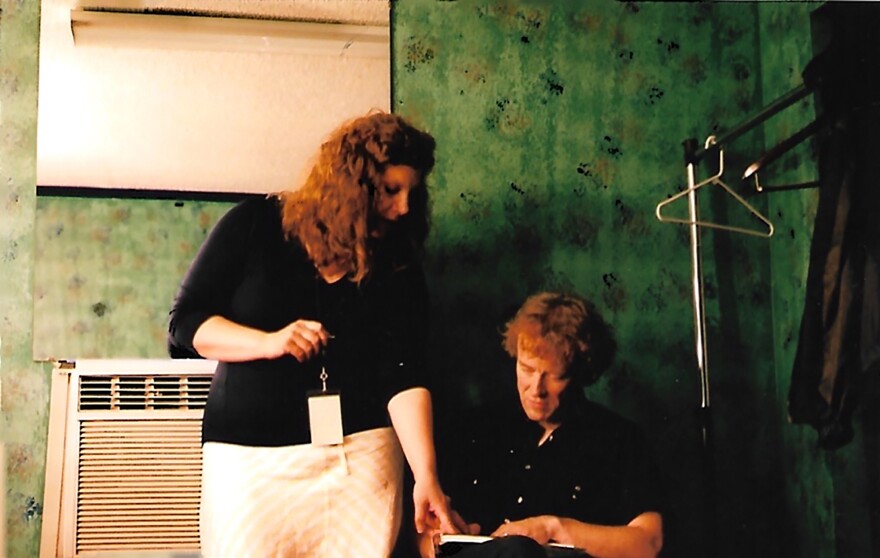Mimi Parker died Saturday, but her voice rings out in the present tense. It's eternal, radiant.
It's a warm, fragile thing, that voice. It shimmers warmly but cuts through the din like a spotlight. It wavers but holds focus. For just one example across nearly three decades of music, listen to "The Plan," from Low's 1996 album The Curtain Hits the Cast:
As in so many Low songs, the words remain minimal to the point of abstraction:
On the step you handed me
Pieces of the plan
At the gate you handed me
Pieces of the plan
Can I hold it for a week
That's it; that's "The Plan" in its entirety, though Parker repeats all or part of that last line — "Can I hold it for a week?" — seven times, in a stretch spanning most of the song's nearly four-minute run time. With each pass, her words unfurl as an exhaled mantra; they hover and dissipate like warm breaths in wintry air.
Even as the Minnesota band's sound grew busier, darker and more challenging, Parker remained an artist of uncommon restraint. She drummed with brushes and mallets, her words restricted to an impactful minimum. But even when she ceded the vocal spotlight to her musical partner and husband, Alan Sparhawk, her presence was unwavering, unpretentious, commanding, vital. She never wasted a stroke or a word.
Low just kept making incredible, innovative records — its 13th album, last year's HEY WHAT, was among the band's best — as Parker lent a sweet, soaring counterpoint to Sparhawk's more desolate sounds. Her commitment to beauty shone across albums that touched on war, depression and isolation; her vocals and spare percussion gave Low's sound a grounding force and a leavening agent all at once.
HEY WHAT deployed Parker's sneaky artistic range to devastating effect. Take "More," which set her angelic voice against a punishing blast of grinding, almost industrial noise:
The song's power doesn't derive from the mere juxtaposition of beauty and abrasiveness. Instead, Parker found a way to meet "More" where it lives, pushing her vocal to extremities she'd rarely visited while still sounding like herself. She was still testing her limits to the end, as her voice kept shining a light through ever more unforgiving terrain.
The band's 13 albums showcase astonishing range for a band that remained so consistent. The sparkling beauty of Things We Lost in the Fire and When the Curtain Hits the Cast somehow fits alongside late-career powerhouses like Double Negative and Hey What, both of which effectively distort and invert Low's formulas. Low's debut album, 1994's I Could Live in Hope, works its magic with only the sparest of building blocks and the air that hangs, conspicuously and forebodingly, between notes. And yet you can hear its echoes in Drums and Guns, which hisses and seethes with punishing intensity.
It's a catalog that flirts with the divine without losing its ground-level understanding of minds wracked with disillusionment and doubt. All of which leads to a distinction that mustn't be forgotten in any survey of Low's career: In 1999, the band made what may well be the last truly great Christmas album.
We're almost to the part of the year when we collectively wonder why so few holiday standards have emerged in the wake of Mariah Carey's 1994 juggernaut "All I Want for Christmas Is You." Your mileage may vary, but the closest thing to a holiday standard we've experienced since then has been Low's "Just Like Christmas," from 1999's Christmas EP. You'll hear it again in commercials soon enough, and if you're like me, you'll want to wrap it around you like a blanket.
That whole EP is divine, as Parker and Sparhawk lead us through notes of graceful melancholy ("Blue Christmas"), brutally stark realism ("If You Were Born Today") and one of the finest versions of "Little Drummer Boy" in existence. But "Just Like Christmas" is the track that's most fully seeped into the public consciousness, and it's a winsome object of sheer joy, as Parker's voice seems to drift from a faraway AM radio speaker while sleigh bells jingle all around her.
I'll remember Mimi Parker that way, as one of the unimpeachably melancholy perennials my family trots out every December. I'll remember hers as the first singing voice my daughter heard after being born. I'll hang on to memories of hearing Parker sing live in crowded clubs, as well as at the Tiny Desk and in a coffeehouse where audience members laid down on the carpeted floor and drifted in and out of blissed-out consciousness. If I stop to breathe deeply and tune out the stray noise, I can still conjure Parker's voice in my head as she holds a single note and lets it wash over the room.
That voice is a light that can never be extinguished. But I'll still miss it for as long as I live.
Copyright 2022 NPR. To see more, visit https://www.npr.org.




